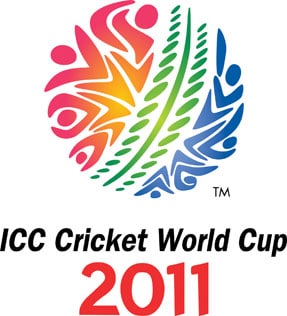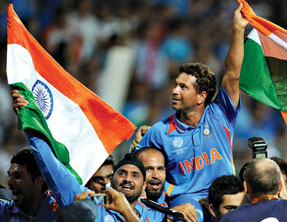| Yeah, sure it’s over and the slam-bang IPL is on, but isn’t it worth recounting the madness of March-April? Of the reams written by everybody and anybody, with bursting pride, patriotism and passion, addressing all the major issues … stuff like — Is Dhoni the greatest Indian captain and is Team India 2011, the best ever? Was the 68 million viewership of the World Cup Finals, a world-record? Beyond true grit, was this year’s tournament, India’s Super Bowl, a sensational commercial carnival to beat all carnivals? Finally, what about the spicy side-shows provided by model Poonam Pandey and her revealing declaration to strip naked, or pregnant mothers threatening to name their kids, Sachin, Mahi, whatever?
First things first. Is Mahi India’s best captain ever? What makes this Jharkhand guy, hardly seven years old in the big league and a little over four as head honcho, so very special? While the first question can be debated to death (with the scales, presently tilting to a yes) the second offers more scope for analysis. Yes, he is indeed a representative of a rare breed and the reasons are there for all to see. Point one, he demonstrates an amazing quality of fearlessness — that marks his persona as captain and person — in his responses to the press. The directness with which he often articulates inconvenient truths without making a fetish of it has to be unique. “They carry,” insists social commentator Santosh Desai, “the sparkling limpidity of new-born, unvarnished ideas. He says things he means, because he needs to, not for effect. He avoids saying too much, recognizing that wordiness is a curse, for it complicates the game creating a large variety of labels and classifications. He prefers to speak the guttural monosyllabic truth and acts likewise.” Point two, there is no pro-active defensiveness in his actions and he stares at the possibility of being criticized right back, refusing to cow down or let it modify his actions. Also, believes Desai: “Dhoni represents a form of wisdom that manages to find the timeless from the transient. He shows us that we can participate in the tumult and glitter of our shiny new lives, scoop in the crores and luxuriate in the material goodies and yet find a way to convert all that into something pure and meaningful … something that connects with dignity is all that really matters.”
In fact, right now, one is tempted to place Dhoni as India’s only uncontested leader. No one carries such collective legitimacy, such popular groundswell ra-ra from every quarter and constituency. Even when he does make a false move, there maybe a buzz, but not one person raises a finger questioning his leadership qualities. Is this team the best ever? A definite no, as any sane cricket follower who understands composition, weak bowling and fielding would acknowledge. But it has to be a thumping yes in terms of absorbing big-game pressure, rising to the occasion when it counts and giving it all required to win. Team India in 2011 was the victim of incredible expectations from day one (when it was labeled, along with Sri Lanka, likely winners) but under inspirational leadership, the team rose to a man to make it happen. Cricket, at the end of the day is a team sport and the very fact that the team rose and glittered makes them Team No.1. Was the viewership record-breaking? Yes, confirms audience measurement company aMap Vice President Jinita Shah: “The Finals viewership broke all records. It increased four times on that sensational Saturday.” While the semi-finals with Pakistan attracted 67.3 million, the finals drew in 68 million. Wow! Was it a commercial freakout? Judge for yourself. Let’s begin with a yesterday-today valuation of broadcast rights. In 1995, the rights went for $5 million. In 2009-11, they went for a whopping $450 million! Next up are titles and other sponsorship. These went for $10,000 to $20,000 in 2003. In 2011, they had rocketed to Rs. $50,000 to $60,000. Advertisers had a ball too! In 2003, the cost for a 10 second spot was $8,000. This year it soomed north of $35,000 to $45,000. Cricketer fees also saw a considerable hike. A-Grade stars — Sachin, Dhoni, Gambhir, Viru, Dravid, Laxman, Raina, Bhajji and Zaheer — get retainers of $220,000 per season. B-Graders — Yuvi, Ishant, Nehra, Pravin, Virat, Vijay and Ojha — get $110,000 and C-graders — Sreesanth, Mishra, Ashwin, Rohit, Pujara, Jadeja, Mithun and Vinay Kumar — get $55,000. In addition to the fees, players receive Rs. $16,000 per test match, $9,000 per ODI and $4,500 per T-20. Top scorers on the sponsorship front are Sachin and Dhoni, with approximately $1 million to $1.5 million per endorsement. The Little Master endorses around 8-10 brands while the captain fronts 10-15 brands. Viru Sewag and Yuvi Singh follow with $220,000 to $450,000 per endorsement. Sewag endorses five brands while the swashbuckling Chandigarh-lad represents four brands. After his sensational comeback in the recent World Cup, Yuvi Singh could be hurtling north both in fees and endorsements. Also, after the recent victory, additional cash prizes of $220,000 to each player, $110,000 to the support staff and $55,000 for the selectors were announced. Why this madness for the sport and over-the-top spending, budget and take-home compared to other sports in India? It’s simple. The collective passion the average Indian has for the sport has to be seen to be believed. To target the Indian consumer at a mass level — cutting across demographic, geographic, socio-economic, language and culture, even gender-barriers — for any marketer, cricket is the number one platform. The game pays. It delivers. It’s an effective platform for any aspirational regional brand wanting to reach a national audience. It gives you reach, eyeballs, impact. No film, reality show or corny award extravaganza can hope to match or is watched with the kind of fervor, passion and involvement as cricket.
What about the entertaining side-shows? Sure there was that too. “I went into labor soon after Sachin was dismissed, but had a gut feeling that we would win,” says Ira Khanna, 28, who gave birth to a baby boy. “I was born in the year we won the World Cup and now I have a son who’s born in the World Cup victory year! I am considering naming him either Sachin or Yuvraj.” In a country where a baby is born every two seconds, Shally Ahuja’s son was instantly baptized “World Cup Ahuja” after the famous victory. Then there is the Poonam Pandey episode. The 20 year old Gladrags and Kingfisher Swimsuit Calendar model emerged from nowhere with a sensational “I’ll bare-all-if-India wins” announcement. She made instant headlines! This wasn’t, incidentally, an original gimmick, having been played out earlier by Parguayan model Larissa Mabel Riqualme Frutos, who was pictured in international media celebrating a goal with a Nokia phone between her breasts, wearing a tee with Paraguayan colors during the 2010 FIFA Cup. She also promised that she would run nude if her country won or reached the semi-final by beating Spain. Named “World Cup Girlfriend” she was instantly one of the most-searched-for-person on the net. Then there was Bobbi Eden, a Dutch porn actress, who attracted global attention when she promised oral sex to the entire team if Netherlands won the Cup. Our Girl Pandey, predictably, chickened out stating she couldn’t do it without Board of Control of Cricket in India’s official permission after which she would happily strip for the team. Her antics got her a following with PETA, which is urging her to strip on behalf of an ad campaign to help animals. She was signed up for Akshay Kumar’s stunt-based reality show Khatron Ke Khiladi 4 for a whopping $110,000. At a press conference she unzipped her jacket to reveal a black bikini top to tantalize reporters. So will Poonam get the last laugh? The jury is still out on in this one. But we can all agree that whatever is in store for her, it’s just not cricket! |
World Cup 2011 Long Shots, Close-Ups & Side Shows!

